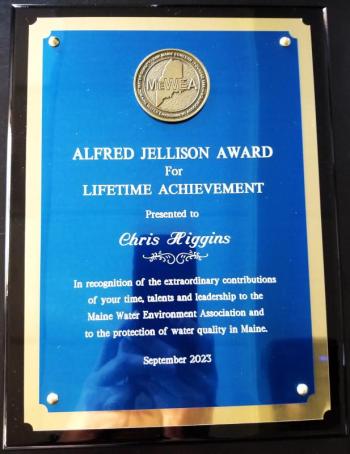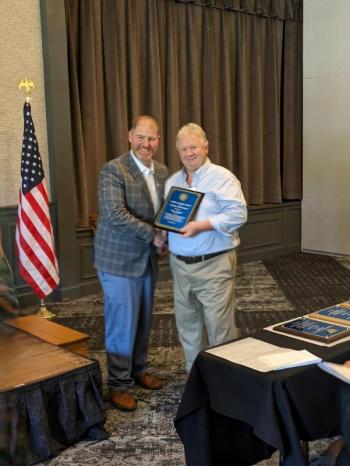On Sept. 21, Boothbay Harbor Sewer District (BHSD) Superintendent Chris Higgins received the Al Jellison Lifetime Achievement Award at the Maine Water Environment Association (MEWEA) annual conference at Sunday River Resort in Newry. Higgins was unaware he had been nominated and was further surprised to receive the award.
“Chris was confidentially nominated for this award by one of the Maine Water Environment Association's past presidents,” wrote Michael Guethle, awards committee chair of MEWEA. “The Al Jellison Lifetime Achievement Award is awarded no more than annually by the MEWEA Executive Committee, and was named for Al Jellison, longtime chief operator of the City of Bangor Wastewater Treatment Facility. This award is designed to recognize individuals who have demonstrated an extraordinary level of service and commitment to MEWEA and to the protection of water quality in Maine over the course of their careers. Fifteen people have been presented this award prior to Chris since 1999.” See mewea.org for past recipients.
"Chris has a reputation for excellence within the industry that I became aware of while I was still a student in college, and it's great to see him formally receive an accolade for that recognition.”
Higgins holds a Grade V Wastewater Operators License from Maine Department Environmental Protection, the state’s highest certification, based on education and experience. He has experience managing industrial facilities that process 40 million gallons per day from his job at Great Northern Paper Company in Millinocket. Boothbay Harbor’s plant is designed to handle 640,000 gallons a day and often hits 400,000 in the summer months.
“Priorities are clear. Public health and the health of our harbor,” Higgins said. “Technology expands so much of what we do. We have a smaller footprint now, taking a six-step treatment process down to two tanks. When I started in 1995, our plant was removing 20% of solid waste before exiting into Boothbay Harbor, now it routinely removes 95- 98%.”
“We began monitoring for COVID-19 in 2019 and we are still sending samples.” During his term, Higgins also brought all operations in-house, computerized the department, doubled the number of employees, expanded the service area, increased the number of pump stations from eight to 21, fostered more cooperation between governing agencies, remediated E.coli, heavy metal and dioxin threats, and has been working toward solutions for PFAS (per-and polyfluoroalkyl substances) also known as “forever chemicals.”
“PFAS is a huge challenge. It has tentacles and keeps reaching, going in every direction,” he said. “In my job, you have to roll with the punches. There are new regulations every year, often leading to new processes. We can usually take care of harmful pollutants in-process, but not PFAS. It’s going to have to be a multi-step and wide-ranging solution,” he said. “The state began to move away from spreading sludge as fertilizer in the ’90s, but as you know, it’s everywhere. It’s in rainwater. We had three fields we used to spread on, none around here, all of them were inland, but still… it’s a problem.”
Outside Boothbay Harbor, Higgins has made lasting contributions to the field. While at Millinocket Wastewater, which was a lagoon facility, Higgins chartered a group of professionals to create standards for lagoon management. Those standards were eventually adopted as best practices by DEP. Shortly after he left Millinocket, Millinocket Wastewater received the Goodenow Award for operational excellence.
Higgins was also an early adopter in researching kelp farming as a means of ammonia uptake with farms set for Bayville and Signal Point. His work with then-EPA Environmental Engineer Shane Rogers (now professor of civil and environmental engineering at Clarkson University) was in line to receive National Science Foundation (NSF) funding, but ultimately did not.
Originally from South Jersey, Higgins moved to Maine when he was 12. He holds a bachelor of science in biology with a concentration in chemistry from University of Maine, and originally intended to teach middle school science. “I didn’t expect, in 1978, to be in wastewater when I retired. It’s been a good career.” Higgins is set to retire from BHSD Dec. 31. Nick DeGemmis, incoming superintendent, will have spent five months training with Higgins and will take on the department’s potential seawall construction project.
“We’ve already seen the effects of climate change on our back cove. Because of sea level rise, during storms our discharge cove has come within six inches of overflowing,” he said. “The seawall construction project is a critical decision for the town.”
Said Higgins, “If I could say anything to the town, I’d say thank you. It’s been a great run. Without support from the region, our work doesn’t happen. And just as much thanks to crews that work so hard here.” As Higgins reflects on his career, the two standouts for him are the people and working with students at the schools. “The people are great; we live in a great community. I used to love having students come over from the school. I’d set out beakers of liquids and they were amazed that they were clear.”





























.png)
.png)

